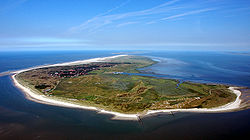Spiekeroog
| Spiekeroog | ||
|---|---|---|

Aerial view of Spiekeroog from the west
|
||
|
||
| Coordinates: 53°46′19″N 7°41′49″E / 53.77194°N 7.69694°ECoordinates: 53°46′19″N 7°41′49″E / 53.77194°N 7.69694°E | ||
| Country | Germany | |
| State | Lower Saxony | |
| District | Wittmund | |
| Government | ||
| • Mayor | Bernd Fiegenheim | |
| Area | ||
| • Total | 18.25 km2 (7.05 sq mi) | |
| Elevation | 3 m (10 ft) | |
| Population (2015-12-31) | ||
| • Total | 768 | |
| • Density | 42/km2 (110/sq mi) | |
| Time zone | CET/CEST (UTC+1/+2) | |
| Postal codes | 26474 | |
| Dialling codes | 0 49 76 | |
| Vehicle registration | WTM | |
| Website | www.spiekeroog.de | |
Spiekeroog is one of the East Frisian Islands, off the North Sea coast of Germany. It is situated between Langeoog to its west, and Wangerooge to its east. The island belongs to the district of Wittmund, in Lower Saxony in Germany. The only village on the island is also called Spiekeroog.The island is part of the Wadden Sea World Heritage Site by the UNESCO and the Wittbülten National Park.
Spiekeroog covers an area of 18.25 km2, the shortest distance to the mainland is 5.7 km. The island is, with the exception of fire and rescue vehicles, free of cars. A daily ferry service from the harbour of Neuharlingersiel connects the island with the German mainland. The island is separated from neighbouring Wangerooge by a gat known as the Harle.
The origin of the name "Spiekeroog" is disputed. Today, most of its people tend to believe that it is a translation of "storage island".
Spiekeroog was first mentioned in 1398 as the island of Spiekeroch. At that time, it was a hiding place for pirates. They were supported by the islanders, but were not averse to robbing them too.
In 1625, 13 families lived on the island, making a living from farming, fishing and the production of muschelkalk or shell-bearing limestone. In later years, whaling and shipping became increasingly important to the island. During the Napoleonic occupation, shipping came to a halt due to the blockade against England which led to great poverty. Smuggling goods to and from the then English Heligoland was the only source of income during that time. In 1812, England attacked the French settlements on the island, but was repelled.
At the beginning of the 19th century, the idea of coastal resorts - having originated in England - became popular among the German North Sea islands. The first coastal resort was founded 1797 on the island of Norderney. Since 1820, guests have been using Spiekeroog for holidays. A weekly ferry service was established from Neuharlingersiel in 1792 and, since 1842, the service has operated on a daily basis. To improve the comfort of tourists and guests, a 1.7 km long horse-drawn railway was built in 1885 between the village and the western beach. It was extended in 1892 to the newly built harbour in the southwest of the island. This horse-drawn railway was replaced by diesel trains on May, 31st, 1949 which makes it the last horse-drawn railway in Germany.
...
Wikipedia




